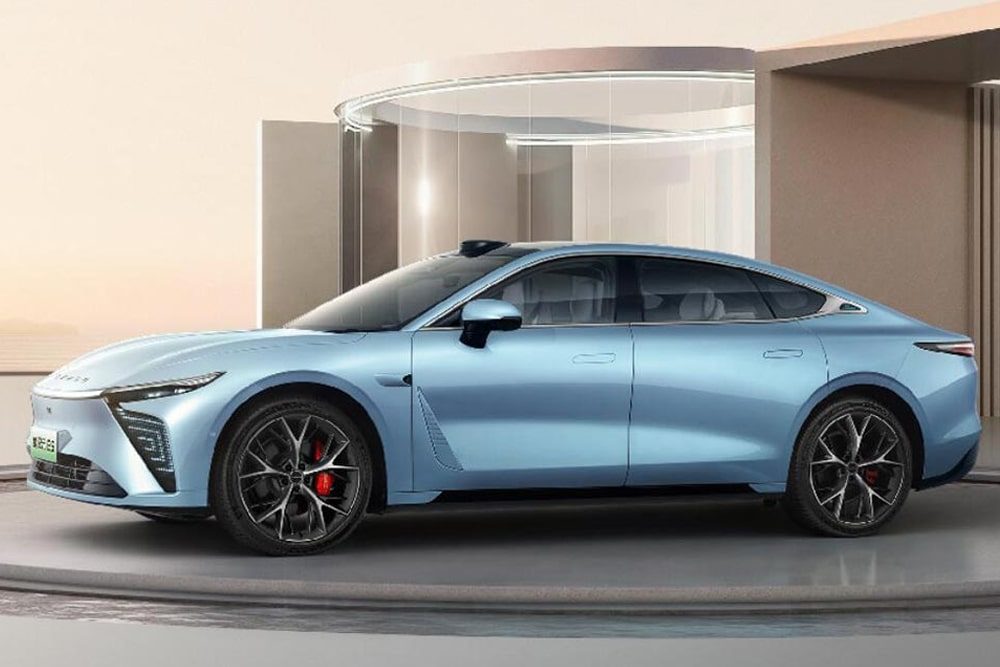China: BEV sales decline; PHEV sales stronger than ever
According to the China Association of Automobile Manufacturers (CAAM), sales of electric cars and plug-in hybrids (so-called new energy vehicles, NEVs) totalled 991,000 in July. Following the 1,049,000 new energy vehicles in June, sales fell below the one million mark again. The decline was 5.5 per cent. However, compared to the same month last year, the result represents an improvement of 211,000 units or 27 per cent.
Battery electric vehicles (BEV) accounted for 551,000 of the 991,000 NEV sales, 10 per cent down on June, but a moderate increase of 2.6 per cent compared to July 2023. Plug-in hybrid sales (PHEV), on the other hand, rose to an all-time high of 438,000 units (+0.5% compared to June, +81% YoY). This trend has been continuing in China for several months now. Fuel cell vehicle sales remain insignificant: they totalled 1,000 units in July.
With these figures, the CAAM records the wholesale sales of car manufacturers, including sales in China and exports to overseas markets. Thus, the export figures can also be analysed. More on this in a moment.
44% of all new cars in July had a plug
Let’s first look at the proportion of electric vehicles in China. As sales across all drive systems totalled 2,262,000 units in July, the proportion of cars sold with plugs rose to 43.8 per cent. In June, it was still 41.1 per cent, given the generally higher number of vehicles sold. Interestingly, total vehicle sales in China fell by 11.4 and 5.2 per cent month-on-month and year-on-year, respectively. That means that the BEV market followed the overall curve almost exactly in the June-July comparison, while the PHEV market was able to score noticeably.
Excluding exports, NEV sales totalled 887,000 units in July (-7.9 compared to June, +30.7% YoY). In turn, NEV exports totalled 103,000 units (+20.6% compared to June, +2.2% YoY). The latter statistic can be broken down further into 77,000 BEVs exported (+20.9% compared to June, -16.7% YoY) and 27,000 PHEVs exported (+19.9% compared to June, +190% YoY). The (planned) punitive tariffs in the EU and the US are clearly not yet a deterrent.
The new July record for plug-in hybrids is also reflected in the monthly balance sheet of China’s top manufacturer BYD. Although the Chinese car manufacturer recorded 10.5 per cent fewer BEV cars sold than the previous month, it set its fifth consecutive monthly record for PHEVs. In total, it sold 340,799 NEV passenger cars, almost a new monthly record (+0.2 compared to June) and a significant increase compared to June 2023 (+30.5 YoY). Plug-in hybrids totalled 210,799 units (+8.1% compared to June, +66.9% YoY), while BEVs still achieved 130,000 sales (-10.5 compared to June, -3.6 YoY). And BYD’s export curve is rising. In July, 30,014 BYD vehicles were shipped to overseas markets, i.e. almost one in ten NEV vehicles. That represents an 11.2 per cent increase compared to June and 65.2 per cent YoY.
Tesla sold 74,117 BEVs in July (+4.4% compared to June, +15.3% YoY) from its Shanghai factory, of which 27,890 were exported, and 46,227 were sold domestically. That represents an increase of 137.4% in exports and a decrease of 22% in domestic sales compared to June. The most popular model from Shanghai in July was the Model Y, which accounted for 56 per cent of sales.
For the Geely Group, the statistics for July show 59,051 NEV units sold, an increase of 58% YoY. That figure includes 30,858 BEVs (+26% YoY) and 28,193 PHEVs (+119%) – so plug-in hybrids are also increasingly generating volume here. Within the group, the e-car brand Zeekr achieved 15,655 BEV sales (+30% YoY), while the Geely brand Galaxy recorded 16,704 NEVs (+66% YoY).
Changan Automobile followed with 45,418 NEVs (+15% YoY). Manufacturer Chery is also approaching quickly, with 45,370 NEV units sold (+255% YoY). Great Wall Motor has lost some ground, selling 24,145 NEVs and is now within striking distance of Nio, which recently sold 20,498 BEVs. Xpeng cannot improve and recorded 11,145 BEVs in July (+4% compared to June, +1% YoY). On the other hand, the young Avatr brand from Changan Automobile, Huawei and CATL is reporting growth and sold 3,625 NEVs (+ 103% YoY) last month.
cnevpost.com (CAAM), cnevpost.com (BYD), cnevpost.com (Tesla), ir.xiaopeng.com, ir.nio.com, autonews.gasgoo.com (Geely), autonews.gasgoo.com (Avatr), autonews.gasgoo.com (Chery),
autonews.gasgoo.com (Great Wall ), autonews.gasgoo.com (Changan)





0 Comments